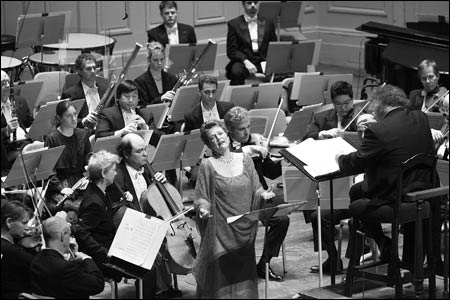
FEW SINGERS WERE MORE HUMAN Hunt Liberson singing her husband’s Neruda Songs with the BSO in November 2005. |
“I don’t want to be here,” soprano Susan Larson lamented in her moving eulogy to her old friend and colleague Lorraine Hunt Lieberson. Those who crowded into the large sanctuary of Emmanuel Church for Emmanuel Music’s memorial tribute to the beloved singer who died far too young last summer felt the same dismay. “Wise people have said no one is irreplaceable,” Larson began. “They are wrong.”Retired Boston Globe classical music critic Richard Dyer and composer John Harbison seconded Larson’s remarks, celebrating Hunt Lieberson’s un-diva-ish humility and wacky sense of humor, her memorable laugh (Larson described it as “something between a bray and a squawk”), the thrilling warmth and beauty of her voice, her electrifying artistry (“so chock-full of ideas and heat and intimacy and surprise”). People nodded at Larson’s description of the way Hunt Lieberson “colored the words like a jazz singer, or the way she could start a tone from nowhere — or from inside her mind, or from another planet. How she could use her mournful sotto voce to slide inside the orchestral texture, becoming a bass flute or a viola or a French horn, then blaze out over the tutti in full human cry.”
Full human cry. Few singers were more human. Or worked harder at becoming so. Dyer remembered being in the Emmanuel Church vestibule and hearing her voice emerge from behind a closed rehearsal-room door, repeating and repeating a musical phrase until she got it to sound the way she wanted it to. He also tallied the extraordinary range of her career, both in New England and around the world. And Harbison, reluctant to speak about their numerous collaborations, spoke instead about the devotion between Hunt Lieberson and her husband, Harbison’s friend composer Peter Lieberson.

When Lorraine Hunt first came to Boston from California, she played viola in the Emmanuel Music Orchestra, then sang Bach cantatas and Schütz motets in the Emmanuel Chorus, all under the direction of Craig Smith. The memorial program began with the sorrowful slow movement of Schubert’s C-major Quintet, with the Lydian String Quartet (Diane Pettipaw sitting in for second violinist Judith Eissenberg, and former Lydian founding member Rhonda Rider playing the “extra” cello). Smith led oboeist Peggy Pearson (Hunt Lieberson’s other close Bach collaborator) and the Emmanuel Orchestra in two soul-piercing Bach chorale preludes and the Emmanuel Chorus in Schütz’s five-part setting of Psalm 116, “Das ist mir Lieb” (“It is pleasing to me”), which Harbison described as Hunt Lieberson’s favorite piece of music. The tribute closed with a recording from 1995 of Harbison conducting Hunt Lieberson in a brief Bach aria, “Wie furchtsam wankten meine Schritte” (“How fearfully my steps wander”), from Cantata No. 33, with that irreplaceable voice emerging from nowhere — or from inside her mind, or from another planet.
Three recordings of live Hunt Lieberson performances have just appeared on CD: John Harbison’s magical setting of six poems by Elizabeth Bishop, North and South (with the Chicago Chamber Musicians, on Naxos) and two Peter Lieberson cycles: the austere Rilke Songs (accompanied by Peter Serkin, from the Ravinia Festival, on Bridge Records), and Neruda Songs (with the Boston Symphony Orchestra led by James Levine, on Nonesuch — the first Levine/BSO collaboration to emerge on commercial disc). Bridge is also reissuing another major Harbison work she premiered, Books 3 and 4 of Mottetti di Montale (http//:www.BridgeRecords.com). Besides our memories of Lorraine Hunt Lieberson, her recordings are now what we have left, and these are among her most moving, and most ravishing. I also hope that these are just the tip of the iceberg, and that her magnificent performances with the BSO, the Metropolitan Opera, and Emmanuel Music will become part of a permanent recorded legacy.
Although quite different from Hunt Lieberson, the Austrian mezzo-soprano Angelika Kirchschlager is also a remarkable singer. Making an auspicious Bank of America Celebrity Series recital debut, accompanied by the outstanding Scottish pianist Malcolm Martineau, she sang “art songs” in German (Schubert, Brahms, and Grieg), French (Liszt), and English (Haydn). Kirchschlager is glamorous (a cross between Helena Bonham Carter and Annette Bening) and projects a large personality. Pushing her mop of dark curls out of her eyes, she laughs out loud or winks when she finds the end of a song amusing; when she’s serious or heroic, she seems to elevate in stature. Her English accent is little rudimentary (“away” became “a-vah-ee”). Her voice tends to get breathy whenever she gets intense, and has occasional rough patches, but mainly it’s beautifully centered up and down the scale, with a warm, coppery luster.